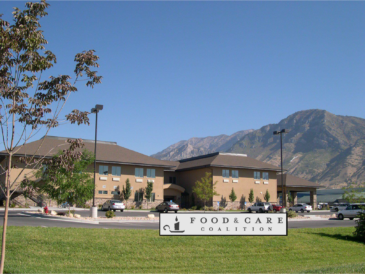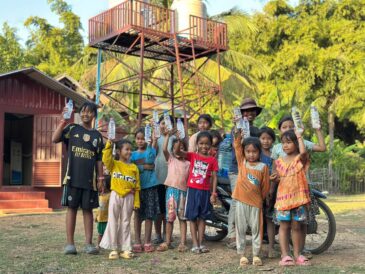Making a Difference: 100 Humanitarians bringing clean water, hope to Kenyan villages
- Heidi Rasmussen Totten, second from left, helped found the nonprofit organization 100 Humanitarians International.
- Children drink water obtained through a bore hole created through 100 Humanitarians International.
- Kenyan residents stand near one of 100 Humanitarian International’s garden towers in the Maasai Mara area of Kenya.
- Darrel L. Hammon

Courtesy 100 Humanitarians International
Heidi Rasmussen Totten, second from left, helped found the nonprofit organization 100 Humanitarians International.
Heidi Rasmussen Totten — a Brigham Young University family science major, technology consultant and business strategist — has learned to listen to her inner voice.
Totten’s friend, Lori Hillebrand Walker, previously had an incredible experience in Kenya and invited Totten to go on her next trip. “I thought heat, dust and bugs?” Totten said. “There are 50 countries I would rather have gone to. Besides, where was Kenya? It definitely wasn’t something I was interested in.”
After Walker returned from her second Kenya trip, she again invited Totten to go on the next trip. She reluctantly signed up, although she felt terrified and completely overwhelmed. Yet something happened there that changed her life forever.
“By the time I was ready to leave, Kenya had become home,” Totten said. “I had a transformational experience and felt it calling to me and really didn’t know how I could leave this place. I tell people I have always believed in God, but I met him first in a mud hut in Kenya.”
Totten came home and started a business together with Walker, calling it the Business Blender. They help women entrepreneurs build businesses.

Courtesy 100 Humanitarians International
Children drink water obtained through a bore hole created through 100 Humanitarians International.
Then, on Sunday, July 12, 2015, Totten climbed out of the shower and heard a voice say, “Go start a group called the 100 Humanitarians, and I will let you know why.” She asked, “Can I get dressed first?” The voice said: “Just go do it.” So she did.
A few weeks later, Totten connected with an organization that became their fiscal sponsor and worked under their nonprofit organization when they created their own 501(c)(3).
100 Humanitarians International’s mission is to “mentor families globally through self-reliance, education and entrepreneurship in an effort to eliminate physical, mental, spiritual and emotional poverty, while preserving culture and tradition.” To achieve their mission and break the cycle of poverty, 100 Humanitarians focuses on four pillars: sustainable food, clean water, education and health. (See https://100humanitarians.org)
One of 100 Humanitarians’ goals is connecting with community members and helping them become more self-reliant. Totten calls it her “side by side, stand next to you” approach that has enhanced what she does.
“We really don’t want to marginalize and make them feel less than. We have just as much to learn from them as they do from us,” she said. “Sometimes we don’t take into consideration that people in developing countries have existed for thousands of years and survived. We think we know better. What we should ask is ‘What can you teach us, and what can we teach you?’ or ‘What do we need to know to better assist you?'”

Courtesy 100 Humanitarians International
Kenyan residents stand near one of 100 Humanitarian International’s garden towers in the Maasai Mara area of Kenya.
In the beginning, Totten saw many humanitarian organizations painting orphanages and working in schools. She asked if anyone was working specifically with families. She was told no.
In her first five years, she worked to discover what impact 100 Humanitarians could make and how they could design a structure to reach as many families as possible. In 2018, after they had built several garden boxes, they realized it was not scalable.
“A community director showed this garden tower made out of shade fabric,” Totten said. “It was a tube about 4 feet tall by 2 inches in diameter with holes burned into the sides that could hold about 120 plants on the sides and the top. We decided to try them out because they were less expensive than what we were doing.”
They initially began with about 30 garden towers that they purchased from a shop in Nairobi. Over time, they changed the pattern and standardized it to go all over the world.
In 2019, a man who became the 100 Humanitarians board chair went to Kenya with Totten. He connected her with Brian Paul from the USANA Foundation. “We wanted to feed the world but didn’t have a sustainability project” Totten said. “So, I pestered Brian about doing a pilot project for 200 Kenyan families. They gave us the grant!”

Darrel L. Hammon
They had reached only 15 families when COVID hit in 2020 and Kenya shut down for several weeks. After they were able to go back to Kenya, it took about one year to help 200 families obtain two garden towers each, one to produce food for the family and one to sell produce to others.
“These towers became an economic engine for the families and vastly increased their financial circumstances,” Totten said. “Now, each family of five has three to five meals with fresh vegetables each week indefinitely, as long as they took care of them, as well as an income from selling lots of produce.”
In 2021, Paul from USANA joined an expedition to Kenya to evaluate the progress. He saw the success and said, “Let’s do 500 families.” Plus, he wanted this project to be integrated into USANA.
“Over the past five years, we have partnered with USANA and provided 12,000 families with almost 22,000 garden towers in Kenya and 60,000 other families in 17 countries around the world,” Totten said.
100 Humanitarians believes in partnering with strong organizations that specialize in certain areas. One such organization is Who Lives, a nonprofit that drills bore holes around the world. They drilled two bore holes in two of 100 Humanitarians’ Kenyan communities. They have also partnered and certified with the Saprea Foundation. Additionally, they have worked with other family foundations to build a school.
“We partner with others to help the students, and we help parents and families with garden towers,” Totten said.
A major idea came to Totten to build a cultural center to house a museum and computers to capture family stories. “The idea came to me as I watched tribes, like the Maasai Mara, one of the original tribes in Kenya, transitioning out of their culture,” Totten said. “Once, they were nomadic, but now education, religion and other changes have begun to shift their culture.”
Moses Masoi, 100 Humanitarians’ Kenya executive director, and his family donated five acres for the center. For years, there was only a fence around the land. During each trip, a little work was done. Then, in 2016, they held a groundbreaking ceremony for the cultural center.
In 2019, Totten’s mother went with her to Kenya and offered to build a guest house where visiting humanitarian teams could stay. In 2020, the house was completed with four bedrooms suites, each with a bathroom. It also has a kitchen and living room.
“Many expedition teams and families now stay at the guest house and participate in a family humanitarian experience, enjoy cultural immersion and enjoy an epic safari. Many businesses come annually. We are located 10 minutes from the number one safari gate where all drivers and safari guides are Maasi warriors,” Totten said.
In 2022, 100 Humanitarians built a large training center with access to Starlink solar, and they are working on implementing a computer lab and partnering with literacy training programs. They currently serve 11 communities spread throughout Kenyan, each with a community director, project managers, sewing teams and tower-building teams. They employ more than 100 people in the various projects.
100 Humanitarians also focuses is helping to provide clean water. To determine clean water needs, they complete a community assessment. They have provided 500 100-liter water storage tanks for a rainwater capture systems and built concrete containers in 20 above-ground protection projects that filter water. Additionally, they have drilled four bore holes in communities, proving clean water for thousands of people.
“We want to provide the best water source for each of our 11 communities spread throughout Kenya,” Totten said. “We just go where the need is. Every day, a new community is asking us to come to their community. We still have lots to do.”
100 Humanitarians also sponsors students. Over the past 10 years, 34 of these students have graduated from both high school and college. The first student who completed both is now one of the community directors on the Maasai Mara.
“Currently, we sponsor 20 students, and an outside groups sponsors another 10 students. Additionally, through our skills development centers, we teach English and financial literacy,” Totten said.
100 Humanitarians has made garden towers, reusable feminine hygiene kits and HopeSaCs, which are fabric thermal cookers. “We want to help the local communities rise out of poverty,” Totten said.
Funding for 100 Humanitarians comes from public donations and other business ventures. “We haven’t received grants or other government funds,” Totten said. “We are focused on grassroots efforts, which have worked for 10 years.”
The future of 100 Humanitarians is positive. On the donated five acres, they plan to build cottages and take more people on expeditions, thus generating additional funding for their projects. Moses is developing an NGO in Kenya, and Totten is creating a Utah LLC to generate additional funding.
“I also created Emparnat to allow people to participate in both our humanitarian projects and go on safaris,” she said.
Recruiting people is an ongoing process. 100 Humanitarians has an email list and various social media pages. In addition to Totten, four other leads schedule separate humanitarian trips.
As with other humanitarian projects, people who go on 100 Humanitarians expeditions change. “Most people who come with us have a transformational experience,” Totten said. “Joining us is like receiving two years of personal development in 10 days. Immersing yourself in a different culture allows you to see your life differently.”
100 Humanitarians relies heavily on their local community directors. “We try to work with our community directors, listen to them and be an advocate for them,” Totten said. “They are the boots on the ground. We are there for 10 days and are gone. They keep things going by working together with us.”
Over the past 10 years, Totten has gone on 27 trips to Kenya and run more than 40 expeditions. Many people have asked Totten what keeps her going. Her answer is simple yet profound.
“I love it, and I love the people,” Totten said. “As long as I can travel, I will be there. It’s my calling! I am just a girl standing in the world trying to make it better.”
If you want to connect with 100 Humanitarians, send an email to heidi@100humanitarians.org, call 801-414-1564 or go to https://100humanitarians.org/.






